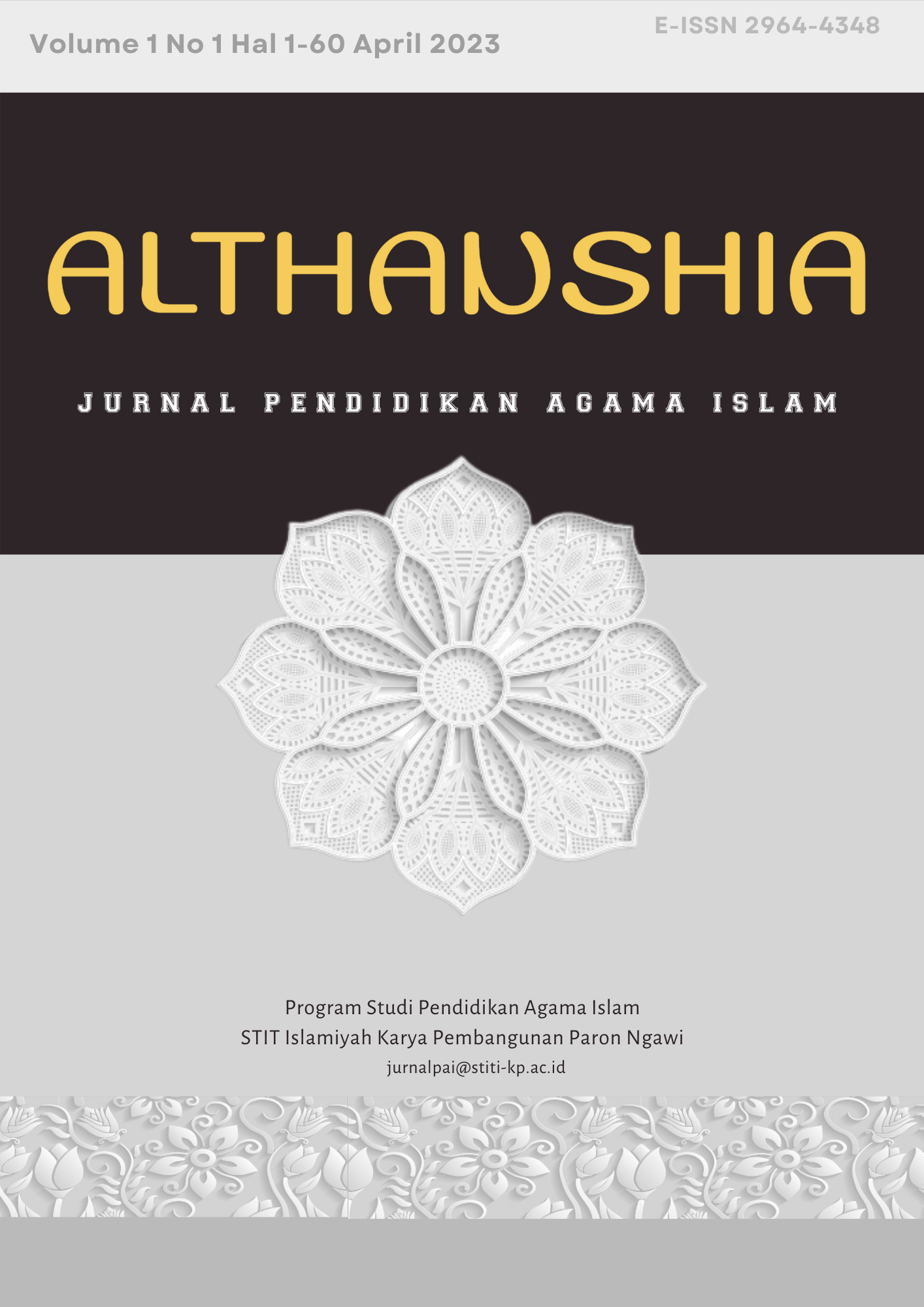Demoralisasi Akademik di Dunia Pendidikan dalam Konsep Loss of Adab Syeid Naquib Al Attas
Abstract
Often educational institutions produce intelligent people who are less aware of the importance of moral values and character in their lives. So that person's higher education does not automatically increase his morality. This case has an impact on the crisis of moral education. This study aims to identify the occurrence of academic demoralization, which is increasingly mushrooming, referring to the concept of loss of adab in the thought of Syed Naquib Al Attas. The method used is descriptive qualitative, and the discussion uses library research. Data collection uses documentation methods in primary and secondary data sources. The results of this study are the occurrence of academic demoralization in the world of education today is the result of the paradigm of secularism and liberalism looking at science which denies religious values. So morals must be revitalized through moral education integrated with educational institutions, families, and the environment. It is hoped that the implementation of the education system in Indonesia can be conceptually reformulated through adab-based education so that it cannot be separated from the values of spirituality and divine trade. Further research must examine the forms of the combination of "ilm and adab " to be a reference in real applications.
References
Abd. Gani, Burhanuddin. “Periwayatan Hadis Dengan Makna Menurut Muhadditsin.†Jurnal Ilmiah Al-Mu’ashirah 16, no. 1 (July 1, 2019): 32. https://doi.org/10.22373/jim.v16i1.5739.
Attas, Muhammad Naguib al, and Syed Ali Ashraf. Aims and Objectives of Islamic Education. Hodder and Stoughton, 1979.
Badaruddin, Kemas. Filsafat Pendidikan Islam: Analisis Pemikiran Prof Dr Syed Muhammad Al-Naquib al-Attas. Yogyakarta: Pustaka Pelajar, 2007.
Dalimunthe, Sehat Sultoni. Filsafat Pendidikan Akhlak. Deepublish, 2016.
Daud, Wan Mohd Noor Wan, and Wan Mod Nor. “The Educational Philosophy and Practice of Syed M.†Naquib Al-Attas, Malaysia: ISTAC, 1998.
Daud, Wan, and Wan Mohd Nor. “The Educational Philosophy and Practice of Syed Muhammad Naquib Al-Attas, Diterjemahkan Oleh Hamid Fahmy Dkk, Filsafat Dan Praktik Pendidikan Islam Syed M.†Naquib Al-Attas. Bandung: Mizan, 1998.
Falah, Riza Zahriyal. “Membangun Karakter Kemandirian Wirausaha Santri Melalui Sistem Pendidikan Pondok Pesantren.†Tarbawi : Jurnal Pendidikan Islam 15, no. 2 (December 19, 2018). https://doi.org/10.34001/tarbawi.v15i2.853.
Husaini, Adian. Pendidikan Islam: Mewujudkan Generasi Gemilang Menuju Negara Adidaya 2045: Kompilasi Pemikiran Pendidikan. Cetakan I. Cilodong, Depok, Jawa Barat: Yayasan Pendidikan Islam At-Taqwa Depok, 2018.
Karnaen, Abdul, Hakim As-Shidqi, and Akrim Mariyat. “The Policy of Moral Education on KH Imam Zarkasyi’s Thought at Gontor Modern Islamic Boarding School.†Jurnal Pendidikan Islam 3, no. 1 (2014): 163–82. https://doi.org/10.14421/jpi.2014.31.163-182.
Lickona, Thomas and Juma Abdu Wamaungo. Mendidik Untuk Membentuk Karakter: Bagaimana Sekolah Dapat Memberikan Pendidikan tentang Sikap Hormat dan Bertanggungjawab. Jakarta: Bumi Aksara, 2012.
Marufah, Nurbaiti, Hayatul Khairul Rahmat, and I Dewa Ketut Kerta Widana. “Degradasi Moral Sebagai Dampak Kejahatan Siber Pada Generasi Millenial Di Indonesia.†NUSANTARA: Jurnal Ilmu Pengetahuan Sosial 7, no. 1 (2020): 191–201.
M.S.I, Nur Kholik, S. PdI. Terobosan Baru Membentuk Manusia Berkarakter di Abad 21: Gagasan Pendidikan Holistik al-Attas. EDU PUBLISHER, 2020.
Ramayulis. Ensiklopedi Tokoh Pendidikan Islam: Mengenal Tokoh Pendidikan di Dunia Islam dan Indonesia. Didistribusikan Ciputat Press Group, 2005.
R.N, KPAI. “Data Kasus Perlindungan Anak 2016 – 2020 | Bank Data Perlindungan Anak.†Accessed October 6, 2022. https://bankdata.kpai.go.id/tabulasi-data/data-kasus-perlindungan-anak-2016-2020.
Suhartono, and Roidah Lina. Pendidikan Akhlak dalam Islam. CV. Pilar Nusantara, 2019.
Vilianita, Risza, Muh Nur Rochim Maksum, and Mohammad Ali Ma’arif. “The Relevance of Education Based on Adab According to the Thoughts of Syed Muhammad Naquib Al Attas with the Current State of the Community,†259–65. Atlantis Press, 2022.
- scatter-mahjong-ways-katalisator-poin-maksimal.html
- sistematisasi-pola-mahjong-ways-untuk-pemula.html
- skema-logika-pola-mahjong-ways-terupdate.html
- panduan-lengkap-pola-gacor-mahjong-ways.html
- rahasia-mahjong-ways-pola-gacor-hari-ini.html
- ulasan-pola-gacor-mahjong-ways-maxwin-terbaru.html
- pola-rtp-mahjong-ways-berbasis-analisis-maxwin.html
- rangkuman-pola-dinamis-pgsoft-berpotensi-maxwin.html
- rekapitulasi-perubahan-rtp-pgsoft-pengaruh-ke-pola-maxwin.html
- tips-akurat-gg-soft-dengan-feeling-kuat-dan-rtp-viral-terupdate.html
- pola-data-maksimal-rtp-maxwin-mahjong-ways.html
- kode-mahjong-ways-yang-sering-terlewat-padahal-penting.html
- strategi-terlengkap-membaca-pola-rtp-terbaik-untuk-kemenangan-di-mahyong-ways-dengan-penjelasan-lengkap-dan-terstruktur.html
- manuver-taktik-pola-rahasia-rtp-habanero-pgsoft.html
- nota-pola-rahasia-taktik-rtp-habanero-pgsoft.html
- pola-gacor-tips-menang-nota-taktik-rahasia-rtp-habanero-pgsoft.html
- rahasia-pola-gacor-nota-taktik-rtp-habanero-pgsoft.html
- transformasi-budaya-latin-estetika-digital-wild-bandito.html
- desain-unik-game-fantasi-modern-pragmatic-pgsoft.html
- fantasi-modern-game-dengan-desain-unik-pgsoft-pragmatic.html
- latar-cerita-dan-karakter-favorit-game-pragmatic-pgsoft.html
- panduan-fitur-dan-mode-game-pragmatic-dan-pgsoft.html
- trik-menang-game-gacor-hari-ini-terungkap-rahasianya.html
- analisis-perubahan-rtp-pragmatic-bulanan-dan-dampaknya.html
- menang-besar-dengan-menguasai-fitur-scatter-pragmatic-multiplier.html
- mengapa-rtp-pragmatic-live-penting-untuk-dipantau-sebelum-bermain.html
- optimasi-waktu-bermain-mahjong-ways-pragmatic-untuk-jackpot.html
- panduan-membaca-pola-spin-dan-rtp-pragmatic-secara-bersamaan.html




 Indeks similarity 30% maximum (exclude bibliography)
Indeks similarity 30% maximum (exclude bibliography)

